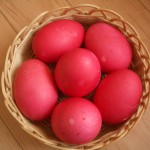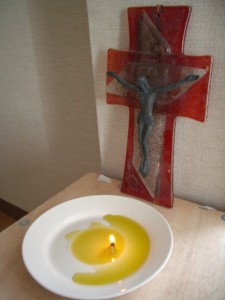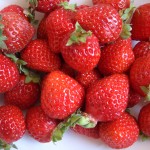 一年で最も盛大で賑やかな祭日、パスハ。キリストの復活と春の到来を祝うこの行事、これから4月4日のパスハに向けて国中が賑やかになっていきますが、3月28日にメガリサラコスティが終わっても、最後の一週間はシーフードやオリーブオイルさえも断ち、楽しむためではなく生きるための食事をいただきます。
一年で最も盛大で賑やかな祭日、パスハ。キリストの復活と春の到来を祝うこの行事、これから4月4日のパスハに向けて国中が賑やかになっていきますが、3月28日にメガリサラコスティが終わっても、最後の一週間はシーフードやオリーブオイルさえも断ち、楽しむためではなく生きるための食事をいただきます。
パスハ当日は肉、卵、乳製品、アルコールなどが解禁になり、いままでの断食を取り返すかのようなギリシャ人本来の豪快な飲食が再開されます。あちこちで男たちは羊や子豚、ウサギなどを丸焼き、女たちはイースターエッグやツレキ(パスハの菓子パン)パスハビスケットなどを作ります。他にもマギリッツァ(羊の内蔵のスープ)やココレッツィ(羊の内蔵の串焼き)なども伝統料理ですが、島、地方、家族によってさまざまな違いがあります。
パスハの時期は、通常学校や会社など2週間ほど休みになります。普段離れて暮らしている家族に会いに行ったり、旅行したりそれぞれのホリデーを楽むため、皆ずいぶん前から計画をたてているのです。日本のお正月やお盆休みに似ていますね。
The biggest and the most important annual event of the Greek Orthodox Church, Pascha. It is celebration of the Resurrection and the advent of spring. Megali Sarakosti will be over on the 28th March. After that day until Pascha, people don’t eat even seafoods and olive oil.
Meets, eggs, milk products and alcohol will be allowed on Pascha. So Greek people enjoy eating as usual. Men barbecue lamp, pig or rabbit, women make Easter Egg, Tsoureki (Pascha bread) and Koulourakia Paschalina (Pascha biscuit). Mageiritsa (offal soup of lamp) of Kokorec (kebab of lamp offal) are also traditional, but there vary in different islands, areas and families.
During Pascha, usually schools and companies are off. So, people plan to go seeing their families or their own travel. It is a pleased long holiday for them, it is the same as New Year’s holiday or Obon holiday in Japan, isn’t it?